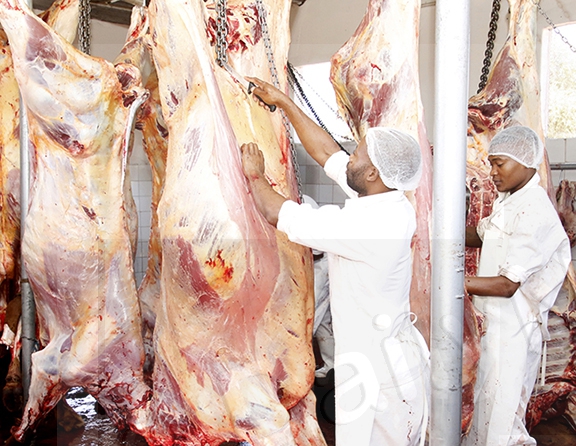Government adopts new agricultural programme
08 Nov 2021
Government has adopted a new arable agricultural programme, which will replace the Integrated Support Programme for Arable Agriculture (ISPAAD). When delivering the State-of-the-Nation Address (SONA) today in Gaborone, President Dr Mokgweetsi Masisi said the new programme would be introduced in June 2022 and was envisaged to increase agricultural productivity, and improve food security in the country.
The President stated that the new changes entailed a clustering system, which would reduce expenses, facilitate the provision of services, such as, electricity and water along clusters.
“The new programme will enable a higher number of farmers to increase production and in the long run will facilitate commercialisation of farming in Botswana,” he said.
President Masisi noted the restrictions on imports of certain vegetables during times of abundant local supply continued to bear fruit.
He cited that the restriction period of vegetables such as; potatoes, onions, beetroots, cabbages and carrots had increased from 9 to 11 months from the previous production season.
He applauded and encouraged Batswana to continue the productivity trend. The President also said the country currently had a storage capacity of two hundred and one thousand metric tonnes (201 000 mt) of grain, in its silos in Francistown, Pitsane and Pandamatenga.
He explained that Special Economic Zones Authority was building additional silos in Pandamatenga with a capacity of sixty thousand (60 000) metric tonnes, which brought the country’s total national capacity to two hundred and sixty one thousand (261 000) metric tonnes.
The President further indicated that the country’s grain production stood at one hundred and nine thousand (109 000) metric tonnes, against three hundred thousand (300 000) metric tonnes of national demand.
“Therefore, the 64 percent deficit presents an opportunity for our local farmers to meet the local demand,” he said.
As part of the efforts to revitalise the beef industry, the President indicated that government had facilitated three private abattoirs to export beef and by-products to international markets, which increased confidence amongst different stakeholders in the beef industry.
Dr Masisi also indicated that the Beef Cluster Competitive Reinforcement Initiative (CRI) had been extended to commercialise the small stock subsector and promote export diversification. In this regard, he highlighted that the construction of the Tsabong Multi-Species Abattoir was under way and expected to be complete by July 2022.
It would service the Kgalagadi, Kweneng West and the Southern districts, he said. The President further explained that to meet traceability requirements for the international market demands, government had procured ear tags, which were available for sale at the Department of Veterinary Services across the country.
The President said since his initiative to distribute rams and bucks to farmers across the country, with a view to improving quality and numbers had an overwhelming response from Batswana.
He had as such expanded the initiative to include distribution of bulls for the improvement of the local beef off take rate.
“Allow me to express my heartfelt appreciation to those supporting this initiative, and urge recipients to take care of animals and maximise their value,” the President stated.
The President acknowledged that the beef industry had been faced with challenges in the past years.
He said as of October 2020, government took a decision to allow for export of live cattle, which is a major relief for farmers and an alternative market for the beef industry. President Masisi said as of September this year, 168 860 live cattle were exported to South Africa and Namibia. The export of live cattle was expected to continue for the next two years, subject to periodic reviews.
The President also stated that new developments were underway to diversify Botswana Vaccine Institute (BVI) products, which is the Regional Reference Laboratory for Foot and Mouth Disease in Sub-Saharan Africa.
“In this regard, the Institute is undertaking a complimentary facility expansion for a new Blending and Filling facility, which will support sustainability efforts, by maintaining current markets and penetrating new international markets,” he said. President Masisi said the expansion project would be completed by the end of 2024.
Regarding the dairy subsector, the President said it had potential to develop the local agricultural sector.
He said milk production for the year 2020/21 was 7.2 million litres, an increase from six million litres compared to the previous year and consequently local milk production remained far short of the national demand of 65 million litres per annum.
The President said this presented a significant opportunity for private sector participation in the dairy value chain.
He highlighted that a number of interventions had been earmarked for the dairy sector development, including alternative breeding systems to increase the dairy herd.
On other issues, the President highlighted that the Industry Support Facility, which is a component of ERTP, had benefitted two hundred and fifty two (252) applicants through financial assistance in the form of interest-free loans.
He said by September 2021, the Facility had disbursed One Hundred Million Pula (P100 million) and the agricultural sub-sectors that had benefited included livestock, poultry, horticulture, dairy, small stock and piggery. The President added that the distribution of the funds across the above-stated subsectors had supported four thousand two hundred and twelve (4 212) agricultural jobs during the COVID-19 pandemic.ENDS
Source : BOPA
Author : BOPA
Location : GABORONE
Event : SONA
Date : 08 Nov 2021



